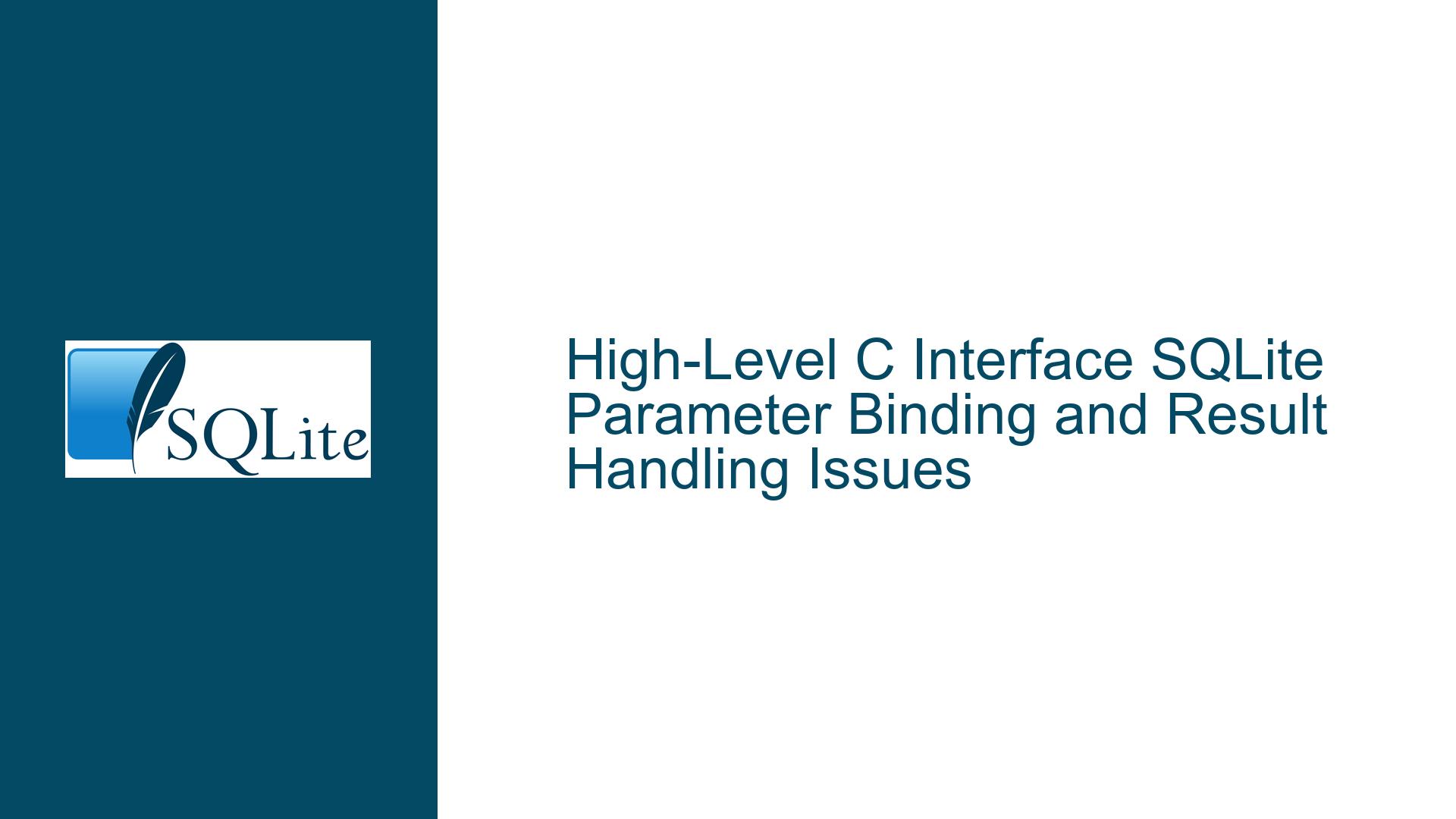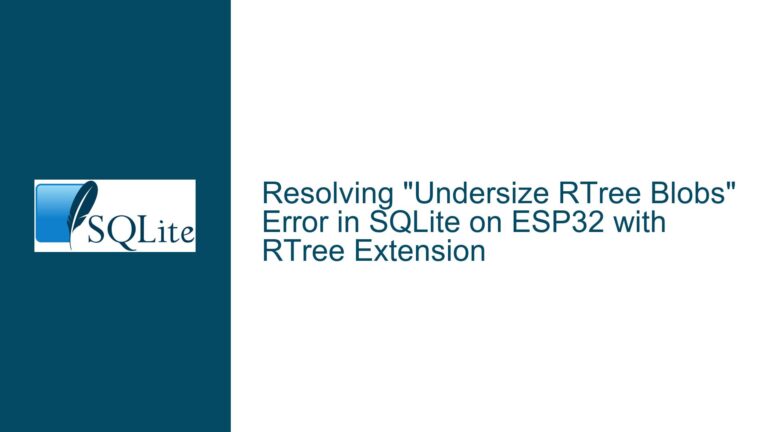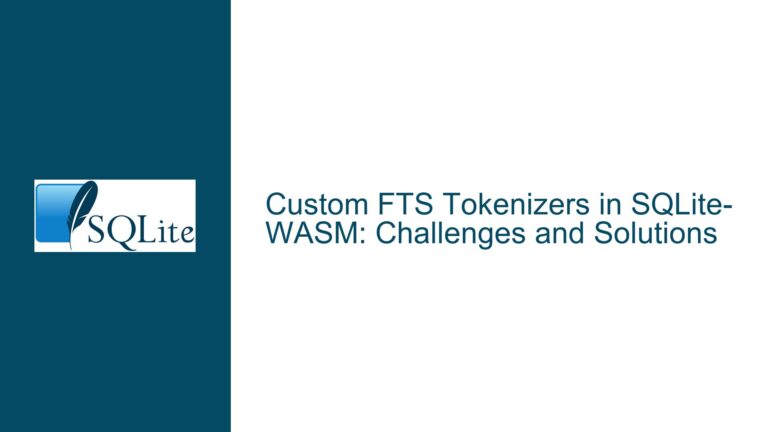High-Level C Interface SQLite Parameter Binding and Result Handling Issues
Understanding Parameter Type Mismatches and Result Conversion Challenges in Custom SQLite Wrappers
The development of high-level C interfaces for SQLite often introduces critical challenges surrounding type safety in parameter binding and result set conversion. This deep dive examines three fundamental aspects of implementing robust database wrappers: 1) SQL parameter binding mechanics using format specifiers, 2) type-driven result value extraction patterns, and 3) error propagation through layered execution contexts. We analyze common failure modes through the lens of memory safety, type coercion rules, and SQLite’s internal type system while proposing hardened implementation strategies.
Parameter Binding Mechanics and Type Specification Systems
The core challenge in SQL parameter binding stems from C’s lack of runtime type information combined with SQLite’s flexible type system. Custom wrapper functions like QueryInt() and sps_execute() attempt to bridge this gap through format string specifications ("i", "ssi", etc.) that map C types to SQLite bind operations. This approach introduces several critical failure vectors requiring meticulous handling.
Format specifier interpretation must account for multiple type dimensions:
- C type size variations (32-bit vs 64-bit integers)
- SQLite storage classes (INTEGER, TEXT, BLOB)
- Memory ownership models (static buffers vs heap-allocated strings)
- NULL value representation in weakly typed languages
Consider the sps_execute example binding a "green" string parameter using "s" specifier. The implementation must:
- Validate parameter count matches format string length
- Convert C
char*to SQLite text using correct encoding (UTF-8/16) - Handle SQLITE_TRANSIENT vs SQLITE_STATIC flags appropriately
- Manage potential buffer overflows if input string lacks null terminator
A common pitfall surfaces when mixing integer types:
long big_num = 2147483648; // Exceeds 32-bit INT_MAX
sps_execute(sps, "query", "i", big_num); // Truncation occurs
The "i" specifier extracts int via va_arg, causing silent truncation of 64-bit values. Robust implementations should enforce specifier-size alignment through static assertions or runtime checks:
#if LONG_MAX > INT_MAX
#define FMT_i_IS_INT 1
#else
#define FMT_i_IS_INT 0
#endif
void bind_param(..., char fmt, va_list *ap) {
if (fmt == 'i' && !FMT_i_IS_INT) {
enforce(0, "Format 'i' requires 32-bit int");
}
}
Blob handling introduces additional complexity through dual-parameter ‘b’ specifiers requiring pointer and length. Implementers must prevent:
- Dangling pointers if blobs are modified post-binding
- Integer overflows in length values
- Misalignment between specified length and actual data size
A hardened blob binding sequence should:
- Validate length >=0
- Cast size to sqlite3_uint64 for internal APIs
- Use SQLITE_TRANSIENT if blob memory isn’t immutable
- Sanity-check pointer alignment for non-byte blobs
Type-Driven Result Extraction and Memory Management
Result value conversion requires inverse mapping from SQLite’s internal types to C variables while respecting format specifiers. The sps_next_row function demonstrates this through its "ssi" format string directing string and integer extraction. Critical considerations include:
- Buffer lifetime management for string/blob outputs
- Type coercion rules between SQL storage classes and C types
- NULL value representation in strongly typed languages
- Pointer validity across row iterations
String handling presents multiple implementation strategies:
- Fixed buffers (char[20] in example): Risk truncation if column value exceeds buffer size. Requires:
strncpy(dest, sqlite3_column_text(stmt,i), dest_size-1); dest[dest_size-1] = 0; - Heap allocation (‘t’ specifier): Must pair allocation size with pointer:
char **out; size_t *len; va_arg(ap, char**); va_arg(ap, size_t*); *out = sqlite3_malloc(sqlite3_column_bytes(stmt,i)); memcpy(*out, sqlite3_column_blob(stmt,i), *len); - Transient references: Direct pointer to SQLite’s internal buffer with lifespan limited to:
- Current step (SQLITE_TRANSIENT)
- Until next sqlite3_step (SQLITE_STATIC)
Type coercion hierarchy must align with SQLite’s rules:
- NULL → C NULL pointer or sentinel value
- INTEGER → C int/long based on value magnitude
- REAL → double with precision loss awareness
- TEXT → UTF-8/16 strings with validation
- BLOB → byte arrays with exact length tracking
Consider this dangerous pattern:
int id = sqlite3_column_int(stmt,0); // 64-bit rowid truncation
Safer alternatives:
sqlite3_int64 rowid = sqlite3_column_int64(stmt,0);
enforce(rowid <= INT_MAX, "ID exceeds int storage");
id = (int)rowid;
NULL handling requires explicit out-of-band signaling since C lacks optional types. Effective strategies include:
- Separate NULL indicator variables:
int is_null; int val = sqlite3_column_int(stmt,0); is_null = sqlite3_column_type(stmt,0) == SQLITE_NULL; - Special sentinel values (e.g., INT_MIN)
- Pointer-based nullability (int* with NULL representation)
Error Propagation Through Execution Contexts and Concurrency
Layered abstractions like sps_context must preserve SQLite’s error states across API boundaries while handling:
- Multi-step query execution (sqlite3_step)
- Schema changes during prepared statement lifetimes
- Transaction state inconsistencies
- Thread-local error messages
The example’s ctx->rc and ctx->count demonstrate partial error handling but miss several critical integration points:
- Error code translation between SQLITE_xxx and wrapper-specific enums
- Error message retention across stack frames
- Transaction rollback on fatal errors
- Thread-safety for error buffers in multi-threaded use
A comprehensive execution context should:
struct sps_context {
sqlite3_stmt *stmt;
int rc;
int count;
char errmsg[256];
sqlite3 *db; // For transaction handling
int auto_rollback; // Flag for automatic rollback
};
Critical error propagation steps:
- Capture SQLITE_xxx code immediately after each API call
- Preserve extended error codes via sqlite3_extended_errcode()
- Snapshot error messages with sqlite3_errmsg() before any subsequent calls
- Map constraint violations to application-specific error hierarchies
Concurrency considerations mandate:
- Prepared statement reset (sqlite3_reset()) before reuse in multi-threaded contexts
- Mutex protection around connection handles if shared across threads
- Transaction isolation level awareness (DEFERRED/IMMEDIATE/EXCLUSIVE)
Example thread-safe transaction handling:
void sps_begin(struct sps_context *ctx) {
pthread_mutex_lock(&ctx->db_mutex);
if (sqlite3_exec(ctx->db, "BEGIN EXCLUSIVE", 0,0,0) != SQLITE_OK) {
// Propagate error
}
}
void sps_commit(struct sps_context *ctx) {
sqlite3_exec(ctx->db, "COMMIT", 0,0,0);
pthread_mutex_unlock(&ctx->db_mutex);
}
Memory safety in error paths requires rigorous resource cleanup:
void sps_rundown(struct sps_context *ctx) {
if (ctx->stmt) {
sqlite3_finalize(ctx->stmt);
ctx->stmt = NULL;
}
if (ctx->auto_rollback && ctx->txn_active) {
sqlite3_exec(ctx->db, "ROLLBACK", 0,0,0);
}
free(ctx);
}
Parameter-Result Type Mapping and Constraint Enforcement
The interplay between format specifiers and variable arguments introduces subtle type compatibility issues that can corrupt memory or produce incorrect query results. This section examines implementation strategies to enforce type safety across the binding/extraction boundary.
Static Analysis Techniques
While C lacks native generics, creative macro systems can enforce type-format alignment:
#define BIND_INT(db, stmt, pos, val) do { \
_Static_assert(_Generic((val), \
int: 1, \
short: 1, \
default: 0), "Invalid integer type"); \
sqlite3_bind_int(stmt, pos, val); \
} while(0)
For format string validation, clang/gcc format attributes can detect mismatches:
typedef enum { FMT_INT, FMT_STR } fmt_type;
void bind_params_impl(fmt_type types[], ...) __attribute__((sentinel));
#define bind_params(fmt, ...) \
do { \
fmt_type _types[] = { parse_fmt(fmt) }; \
bind_params_impl(_types, __VA_ARGS__, FMT_END); \
} while(0)
Runtime Type Checking
When static analysis isn’t feasible, implement runtime validation:
void bind_param(sqlite3_stmt *stmt, int pos, char fmt, va_list *ap) {
switch (fmt) {
case 'i': {
int val = va_arg(*ap, int);
if (val < INT_MIN || val > INT_MAX) {
// Handle truncation
}
sqlite3_bind_int(stmt, pos, val);
break;
}
case 'l': {
long val = va_arg(*ap, long);
sqlite3_bind_int64(stmt, pos, val);
break;
}
// ... other types
}
}
SQLite Type Affinity Considerations
SQLite’s manifest typing requires awareness of column affinity when extracting results:
int column_as_int(sqlite3_stmt *stmt, int col) {
switch (sqlite3_column_type(stmt, col)) {
case SQLITE_INTEGER:
return sqlite3_column_int(stmt, col);
case SQLITE_FLOAT:
return (int)sqlite3_column_double(stmt, col);
case SQLITE_TEXT: {
const char *text = sqlite3_column_text(stmt, col);
return strtol(text, NULL, 10);
}
default:
return 0; // Or error
}
}
Mitigation Strategies and Hardened Implementation Patterns
Parameter Binding System
- Type-Safe Wrapper Functions
typedef union {
int i;
double d;
const char *s;
// ... other types
} sql_param;
void sql_bind_int(sqlite3_stmt *stmt, int pos, int val) {
sqlite3_bind_int(stmt, pos, val);
}
void sql_bind_text_transient(sqlite3_stmt *stmt, int pos, const char *val) {
sqlite3_bind_text(stmt, pos, val, -1, SQLITE_TRANSIENT);
}
// Macro to dispatch based on type
#define BIND_PARAM(stmt, pos, val) _Generic((val), \
int: sql_bind_int, \
const char*: sql_bind_text_transient \
)(stmt, pos, val)
- Format String Validation
void validate_fmt(const char *fmt, int param_count) {
int expected_len = strlen(fmt);
if (expected_len != param_count) {
fatal("Format length %d != param count %d", expected_len, param_count);
}
for (int i=0; fmt[i]; i++) {
if (!strchr("islbtdv^?$@", fmt[i])) {
fatal("Invalid format char '%c'", fmt[i]);
}
}
}
- Named Parameter Support
void bind_named_param(sqlite3_stmt *stmt, const char *name, char fmt, ...) {
int idx = sqlite3_bind_parameter_index(stmt, name);
if (!idx) {
fatal("No parameter %s", name);
}
va_list ap;
va_start(ap, fmt);
bind_param(stmt, idx, fmt, &ap);
va_end(ap);
}
Result Handling System
- Type-Coercion Safety
int64_t sql_column_int64(sqlite3_stmt *stmt, int col) {
switch (sqlite3_column_type(stmt, col)) {
case SQLITE_INTEGER:
return sqlite3_column_int64(stmt, col);
case SQLITE_FLOAT:
return (int64_t)sqlite3_column_double(stmt, col);
case SQLITE_TEXT: {
const char *text = (const char*)sqlite3_column_text(stmt, col);
return strtoll(text, NULL, 10);
}
default:
return 0; // Or error
}
}
- Buffer-Bound String Extraction
void sql_column_text_buf(sqlite3_stmt *stmt, int col, char *buf, size_t size) {
const char *text = sqlite3_column_text(stmt, col);
int bytes = sqlite3_column_bytes(stmt, col);
size_t copy_len = bytes < size-1 ? bytes : size-1;
memcpy(buf, text, copy_len);
buf[copy_len] = '\0';
}
- Blob Handling with Length Validation
struct blob {
const void *data;
size_t len;
};
struct blob sql_column_blob_safe(sqlite3_stmt *stmt, int col) {
struct blob b;
b.data = sqlite3_column_blob(stmt, col);
b.len = sqlite3_column_bytes(stmt, col);
if (!b.data && b.len > 0) {
fatal("NULL blob pointer with non-zero length");
}
return b;
}
Comprehensive Error Handling
- Error Context Stack
struct error_ctx {
int code;
char message[512];
const char *sql;
unsigned line;
struct error_ctx *prev;
};
__thread struct error_ctx *error_stack;
void push_error(sqlite3 *db, const char *sql, int line) {
struct error_ctx *err = malloc(sizeof(*err));
err->code = sqlite3_extended_errcode(db);
snprintf(err->message, sizeof(err->message), "%s", sqlite3_errmsg(db));
err->sql = sql;
err->line = line;
err->prev = error_stack;
error_stack = err;
}
void pop_error() {
if (error_stack) {
struct error_ctx *prev = error_stack->prev;
free(error_stack);
error_stack = prev;
}
}
- Transaction State Machine
enum txn_state {
TXN_NONE,
TXN_BEGUN,
TXN_COMMITTED,
TXN_ROLLED_BACK
};
struct connection {
sqlite3 *db;
enum txn_state txn;
int savepoint_depth;
};
void begin_transaction(struct connection *conn) {
if (conn->txn != TXN_NONE) {
fatal("Nested transaction");
}
exec_sql(conn, "BEGIN");
conn->txn = TXN_BEGUN;
}
void commit_transaction(struct connection *conn) {
if (conn->txn != TXN_BEGUN) {
fatal("Commit without active transaction");
}
exec_sql(conn, "COMMIT");
conn->txn = TXN_COMMITTED;
}
Final Recommendations for Robust Wrapper Implementation
Adopt Gradual Type Checking
- Use static assertions for type sizes
- Implement format string verification at compile-time via code generation
- Generate wrapper functions from declarative schemas
Memory Safety Guarantees
- Use RAII patterns for statement handles
- Implement automatic pointer ownership tracking
- Integrate with sanitizers (ASAN, UBSAN)
SQL Injection Prevention
- Validate all string parameters against injection patterns
- Use RESTRICTED pragmas where possible
- Implement prepared statement caching
Cross-Platform Compatibility
- Handle endianness in blob serialization
- Account for 32/64-bit data model differences
- Normalize text encodings (UTF-8/16/32)
By systematically addressing type mapping ambiguities, enforcing memory safety contracts, and propagating error states faithfully through abstraction layers, developers can create SQLite C wrappers that combine ergonomics with robustness. The techniques presented here—from format string validation to transaction state machines—provide a blueprint for building database interfaces that prevent common pitfalls while maintaining performance and flexibility.






